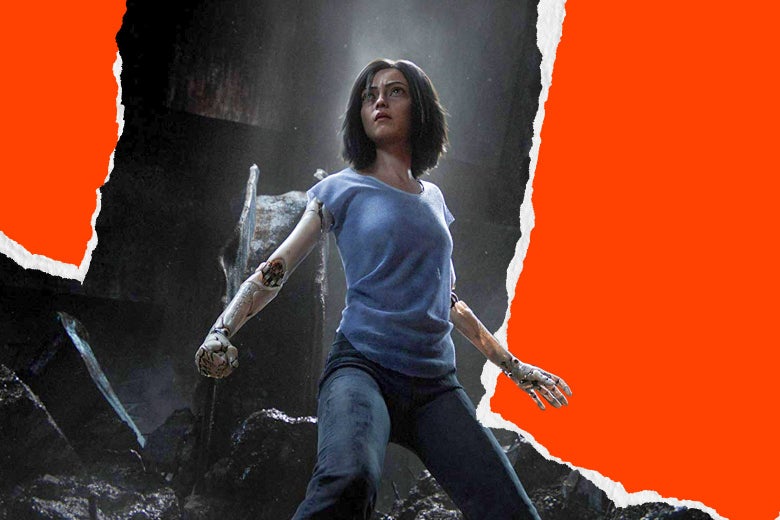
Rosa Salazar in Alita: Battle Angel (2019)
Photo illustration by Slate. Photo by Twentieth Century Fox.
In Slate’s annual Movie Club, film critic Dana Stevens emails with fellow critics—this year, Bilge Ebiri, Karen Han, and Alison Willmore—about the year in cinema. Read the first entry here. Read the previous dispatch in the series here.
Dear Dana, Bilge, and Alison,
Bilge, I can’t express just how much of a relief it is to hear that I wasn’t the only person on Earth who wasn’t with Uncut Gems 100 percent. I love Sandler’s performance—as well as the rest of the entire cast, particularly Kevin Garnett (a friend and I were discussing how they should find room for him in the new Space Jam, except that his acting clearly exceeds the level of the Toon Squad)—but it’s maybe just a bit too cynical a movie for me. No, there’s no other way for the movie to end, and Howie winning would feel like a cop-out, but it’s just not for me. And that happens sometimes—no movie is perfect for everyone. (Except Parasite. Parasite is universal, and if you disagree, I’m sorry, but you are wrong. I don’t make the rules.)
There are several movies that came out this year that I personally love but recognize to be too idiosyncratic in one way or another to be universally recommended. One of the tough things about putting together a Top 10 list is figuring out how to define “best.” Does “best” mean the movies you loved the most, or the ones you think will have the most lasting effect on the canon? I tend to go for a mix of both, though leaning into the former category allows a little personal opinion to broaden the field. This year, that meant struggling with exactly where to place S. Craig Zahler’s Dragged Across Concrete and Robert Rodriguez’s Alita: Battle Angel. Ultimately, neither of them ended up on my list, but that’s not for lack of love.
It’s indisputable that Zahler isn’t for everyone. His movies are brutal (there are vivisections and skulls smashed into pulp), and in the case of Dragged Across Concrete, espouse some problematic ideas despite Zahler’s insistence that his movies aren’t political. (This is bullshit. No art is apolitical; no stance is still a stance.) But his latest work, which stars Vince Vaughn and Mel Gibson (in an annoyingly great performance, and a political piece of casting in and of itself) as two cops who turn to vigilantism after being suspended for brutalizing a suspect, is a grim wonder. It’s Zahler at his most Zahler-esque, moving at exactly the speed Zahler wants it to, i.e., at the speed of molasses. (One scene consists solely of a character eating a sandwich.) The degree to which Zahler focuses on the mundane only makes it all the more shocking when events finally, inevitably, turn violent.
A detour planted in the center of the film illustrates this principle perfectly. Jennifer Carpenter plays a new mother suffering from postpartum depression, and her introduction, which depicts her struggle to leave her baby and go to work, is wrenching. She wavers back and forth, again and again, before finally leaving. When she finally arrives at work, it’s only to be slaughtered by bank robbers. It’s awful to watch and a sequence I hated when I first saw it. How cruel, and how unnecessary—but the world, as Zahler sees it, is cruel, and he knows exactly how to communicate that. And everyone gets their due in the end. That said, as much as I think of Dragged Across Concrete, it’s absolutely not a movie I’d go out of my way to recommend to … anyone else.
Similarly idiosyncratic, though pleasurable instead of painful, is Alita: Battle Angel, which regrettably ended up being a rallying point for a certain toxic breed of fan (they trumpeted it as an alternative to the “SJW” option of Captain Marvel). Subsequent cultural twisting aside, Alita is one of the most remarkable action movies of the year. It’s not the robot fights that I’m thinking of when I say this—though watching Christoph Waltz go to town with a giant rocket hammer did bring me great joy—but the invented sport of motor ball. Robots with wheels zoom around a giant race course and throw a ball back and forth, all while trying to destroy each other. It’s shot and edited more clearly than any superhero skirmish in recent memory; there’s never any question as to where the ball is, nor who’s trying to demolish who, and it’s a total delight.
The sheer joy of motor ball is enough for Alita: Battle Angel to jockey for a spot in my end-of-year list, but I also recognize that most of the movie is total nonsense. Jeff Fahey stars as a robot who owns a lot of robot dogs, Edward Norton appears for roughly five seconds after spending most of the movie possessing other bodies, Alita keeps another character alive by pumping blood into their severed head, etc. In the same way that some thought Cats was crazy and some thought Cats was boring, many viewers will just find the whole thing too absurd to invest in. It’s not as broadly appealing as, say, John Wick 3. But I, personally, would watch motor ball for hours on end. I would buy motor ball merch. I would buy a cable subscription to watch motor ball games.
Then again, I have become known amongst my colleagues as a champion of bad taste, or, as I think of it, great taste. (One of my first acts at my current post at Polygon was to convince my co-workers—and Bilge—to accompany me to a second screening of Mortal Engines because I loved it so much.)
PREPARE TO INGEST,
Karen
from Slate Magazine https://ift.tt/2PZldLV
via IFTTT
沒有留言:
張貼留言